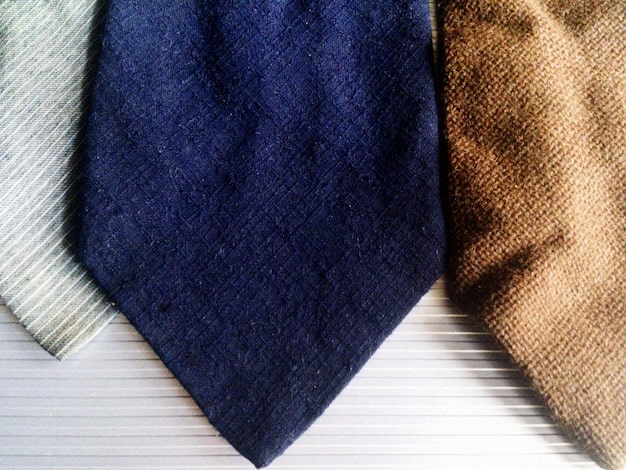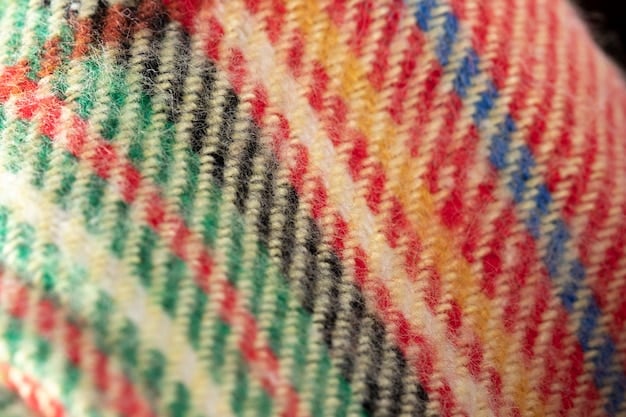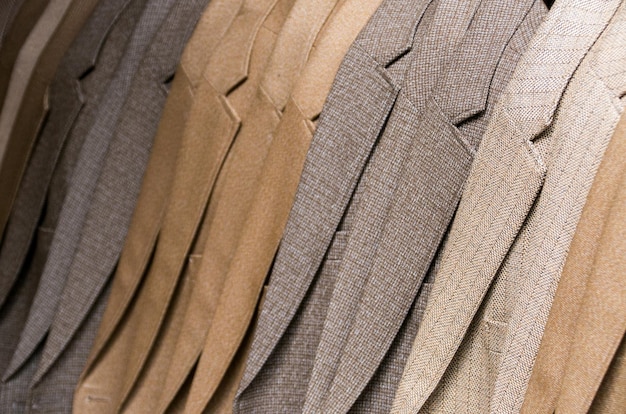The Ultimate Guide to Men’s Suit Fabrics 2025: Choose the Perfect Material

Anúncios
Navigating the world of men’s suit fabrics can be daunting; this comprehensive guide simplifies the selection process, providing insights into the best materials for every occasion in 2025, ensuring both style and comfort.
Anúncios
Choosing the right fabric for your suit can make all the difference. This **The Ultimate Guide to Men’s Suit Fabrics: Choosing the Right Material for Every Occasion in 2025** will break down everything you need to know to make the perfect choice.
Understanding Suit Fabrics: A Comprehensive Overview
The fabric of a suit is more than just material; it’s the foundation of its look, feel, and durability. Different fabrics offer unique advantages and are suited for various occasions and climates.
Anúncios
The Importance of Fabric Choice
The fabric you choose impacts not only the suit’s appearance but also its comfort and longevity. Consider factors like breathability, wrinkle resistance, and seasonal appropriateness.
- Appearance: Fabric determines the suit’s texture, drape, and overall aesthetic.
- Comfort: Breathable fabrics keep you cool, while heavier ones provide warmth.
- Durability: High-quality fabrics withstand wear and tear, ensuring the suit lasts longer.
Ultimately, understanding the nuances of different suit fabrics is key to making an informed and stylish choice.
Wool: The Classic Choice for Men’s Suits
Wool is a timeless and versatile fabric that remains a staple in men’s suiting. Its natural properties make it an excellent choice for a wide range of climates and occasions.

Types of Wool
Not all wool is created equal. Different types of wool offer varying levels of softness, durability, and texture.
- Worsted Wool: Smooth and durable, ideal for business suits.
- Tweed: A heavier, textured wool perfect for colder months and casual occasions.
- Merino Wool: Exceptionally soft and luxurious, suitable for high-end suits.
Selecting the right type of wool depends on your specific needs and preferences. Consider the climate and the formality of the occasions where you’ll be wearing the suit.
Wool’s natural crimp provides insulation, while its ability to absorb moisture keeps you comfortable. Its wrinkle resistance also makes it a practical choice for travel and daily wear.
Linen: A Summer Staple
Linen is a lightweight and breathable fabric that is perfect for warm weather. Its natural texture and relaxed appearance make it a stylish choice for summer suits.
Benefits of Linen
Linen offers several advantages for summer suiting, including its breathability and unique aesthetic.
Linen’s breathability helps keep you cool in hot weather, while its lightweight nature ensures comfort. Its distinctive texture adds character to any outfit.
However, linen is prone to wrinkling, so it’s best suited for casual occasions where a slightly rumpled look is acceptable.
For a relaxed yet stylish summer look, linen is an excellent choice.
Cotton: A Versatile Option
Cotton is a versatile and affordable fabric that can be used for a variety of suit styles. Its breathability and comfort make it a popular choice for casual suits.

Cotton Suit Styles
Cotton suits come in various styles, each offering a unique look and feel.
- Seersucker: A puckered fabric perfect for hot weather.
- Chino: A durable and versatile cotton twill.
- Corduroy: A ribbed cotton fabric ideal for cooler months.
Cotton’s absorbent properties also make it comfortable in humid conditions. However, it’s less wrinkle-resistant than wool, so it may require more frequent ironing.
Overall, cotton is a practical and stylish choice for casual suiting.
Silk: A Luxurious Choice
Silk is a luxurious and elegant fabric that is perfect for special occasions. Its smooth texture and lustrous appearance make it a standout choice for formal events.
Characteristics of Silk
Silk offers several unique characteristics that set it apart from other suit fabrics.
- Smooth Texture: Silk has a luxurious feel against the skin.
- Lustrous Appearance: Its natural sheen adds elegance to any suit.
- Lightweight: Silk is comfortable to wear, even in warmer climates.
Silk’s delicate nature requires special care, including professional cleaning and careful storage. However, its luxurious appearance makes it a worthwhile investment for special occasions.
For a sophisticated and elegant look, silk is an unparalleled choice.
Polyester and Blends: Balancing Cost and Durability
Polyester and fabric blends offer a cost-effective and durable alternative to natural fibers. These materials are often used to create suits that are wrinkle-resistant and easy to care for.
Benefits of Polyester and Blends
Polyester and blends offer several practical advantages, including affordability and durability.
Polyester is highly resistant to wrinkles and shrinking, making it a low-maintenance option. Blends combine the benefits of natural and synthetic fibers, offering a balance of comfort and durability.
However, polyester is less breathable than natural fibers, so it may not be the best choice for hot weather.
If you’re looking for an affordable and low-maintenance suit, polyester and blends are worth considering.
Choosing the Right Lining
The lining of a suit is an essential component that affects its comfort and drape. Different types of linings offer varying levels of breathability and durability.
Types of Linings
Common lining materials include:
The lining should complement the outer fabric and enhance the suit’s overall feel and appearance.
Wool: Best suited for cooler weather, providing insulation and warmth.
Cotton: Comfortable and breathable, ideal for warmer seasons and casual occasions.
Polyester: A durable and wrinkle-resistant choice, perfect for travel suits.
Silk: Adds a touch of luxury, best for special events and formal wear.
| Key Point | Brief Description |
|---|---|
| 🧥 Wool Suits | Classic choice, versatile, suitable for various occasions. |
| ☀️ Linen Suits | Lightweight, breathable, perfect for summer. |
| 👔 Cotton Suits | Versatile, comfortable, ideal for casual settings. |
| ✨ Silk Suits | Luxurious, elegant, best for special occasions. |
Frequently Asked Questions
▼
Linen and lightweight cotton are excellent choices for staying cool in hot weather. Their breathable nature allows for air circulation, keeping you comfortable.
▼
Wool suits should be dry cleaned. Store them on wide, shaped hangers to maintain their form and prevent wrinkles. Avoid frequent washing to prolong their lifespan.
▼
Worsted wool and polyester blends are known for their durability. These fabrics can withstand regular wear and tear, making them ideal for frequent use.
▼
Linen suits are generally too casual for formal business meetings, but they can work in relaxed or creative environments. Consider the company’s culture and dress code.
▼
A suit blend combines different fibers, such as wool and polyester, to balance comfort, durability, and cost. This gives you the benefits of multiple fabrics.
Conclusion
Choosing the right suit fabric involves a balance of style, comfort, and practicality. By considering the occasion, climate, and your personal preferences, you can select a fabric that ensures you look and feel your best in 2025.






